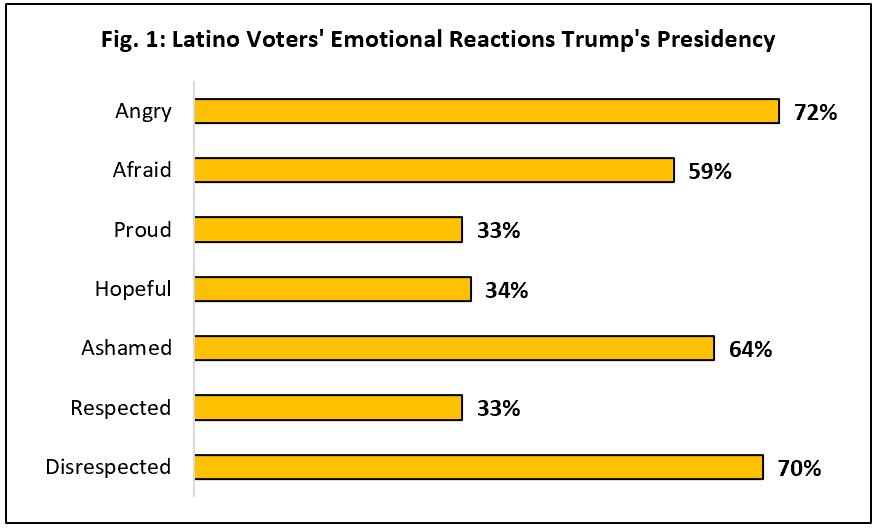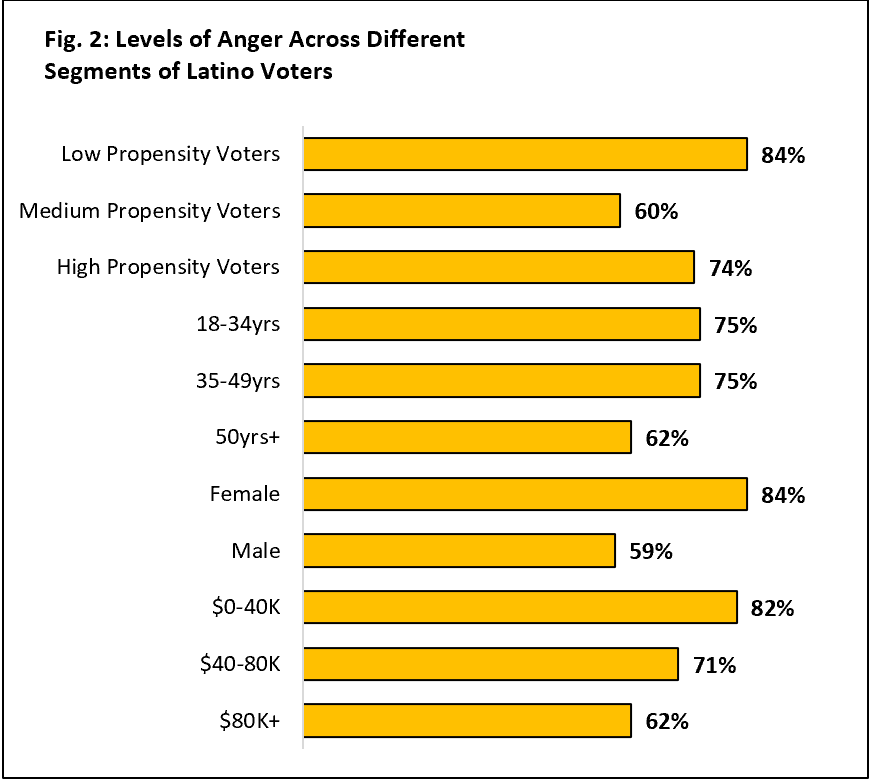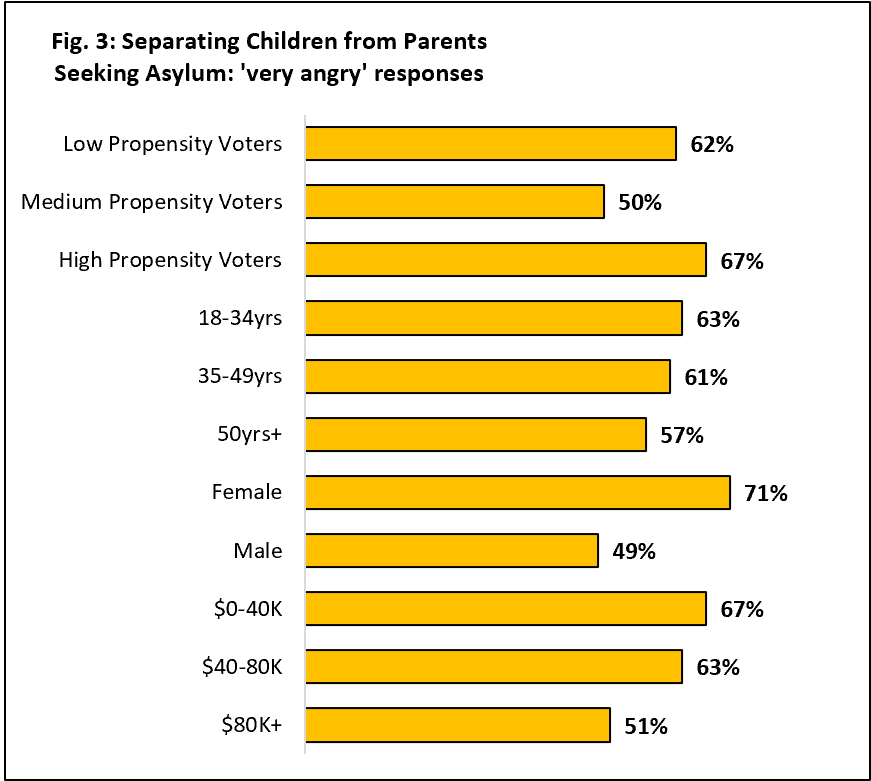With the mid-term Congressional Elections just months away, Latino Decisions has released the results of a survey of 2,045 registered voters residing in 61 competitive congressional districts. Not surprisingly, the results show that across different groups there is widespread interest and eagerness for voting in the 2018 election. However, the poll also allows us to take a deeper look at the motivating factors driving this interest and eagerness. This analysis considers the factors motivating Latino voters to turnout this November.
When looking at elections, pundits typically look to find which policy issues are driving voters to the polls and shaping their vote choice. Of course, issues matter, but so do feelings, according to recent studies by University of Michigan political psychologists. Research by Professor Nicholas Valentino and colleagues demonstrate the power of negative and positive emotions in driving turnout. Among the emotions analyzed, they find that anger is one of the most powerful feelings to spark turnout. Anger arises when a threat is identifiable and an individual feels a sense of control over the situation. This stands in contrast to another negative emotion, anxiety, which is triggered when an individual is less certain of the source of the threat, making him or her feels powerless to mitigate the danger.
The Latino Decisions poll included a battery of questions capturing a range of emotions evoked by Donald Trump’s presidency. Specifically, the survey asked, “Has Donald Trump, because of the kind of person he is or because of something he has done or said, ever made you feel [insert the emotion].” Figure 1 lists Latino reactions to seven emotional dispositions.

What is evident from Figure 1, is that Latino reactions to Donald Trump are overwhelmingly negative and include feelings of anger, fear, shame and disrespect. Out of these negative emotions, anger tops the list. This is significant in light of social science research demonstrating the power of anger in motivating voter turnout and other forms of political actions As noted earlier, feelings of fear or anxiety can have a demobilizing effect because they can induce a sense of powerlessness. In the Latino Decisions survey, fear is present (59%), but overtaken by feelings of anger (72%), shame (64%) and disrespect (70%), suggesting that Latinos feel a sense of power in this election.

Feelings of anger differ across various segments of the Latino population. Segments that are angrier have a higher predisposition to turnout this November. In order to gauge this likely variation in turnout, I disaggregate respondents by different socio-demographic characteristics and by their propensity to vote (see Figure 2). Typically, candidates and parties focus their mobilization strategies on high propensity voters, as they have a history of going to the polls, relative to infrequent or low-propensity voters. Looking at the results, we see that anger is highest among low propensity voters, women, and low-income Latinos. In each of these cases, eight-in-ten respondents said that Donald Trump made them feel angry. Also noteworthy is the high rates of anger displayed by millennials (18-34 yrs). I flag millennials because they, like low-propensity voters and low-income voters, typically have lagging rates of turnout. Our data show that Latinos with historically low rates of turnout are likely to defy the trend this election as a result of the anger they feel toward Trump.

Beginning in April 2018, the Trump Administration implemented one of its most draconian policies toward immigrants: separating over 2,000 children from parents who were seeking asylum and placing both in detention centers while awaiting adjudication outcomes. The backlash against this policy was swift and we suspected this issue was particularly offensive to Latinos. In the survey, we asked respondents to state the degree to which this policy angered them. Overall, 85% of Latinos said this policy made them feel “somewhat” to “very angry.” Figure 3, disaggregates the “very angry” responses across different groups of Latinos. The data show that Latinas were particularly incensed by this policy, with 71% stating that it made them feel “very angry.”
In recent years, Latinas have made significant political strides. The victory of 28-year old Alexandria Ocasio-Cortez in New York’s 14th Congressional district is indicative of their growing political presence. The fact that Latina voters, by a significant margin feel the greatest sense of anger at the president’s actions and policies, suggest that they will be a driving political force this November. Taken together, these results are encouraging for the Democratic Party, but it will require them to target Latinos that have historically been ignored by the Party – Latinas, millennials, low-income and low-propensity voters.
Donald Trump’s unlikely victory over Hillary Clinton was a shock to Latinos and other voters. Since his victory, Trump has initiated a series of heavy-handed policies targeting undocumented immigrants. Almost every media story about these policies and their consequences emphasizes the fear and anxiety gripping immigrant and Latino communities. The strategy of fear is designed to deter future flows of undocumented immigrants and bolster the policy of “self-deportation.” It comes as no surprise that Tom Homan, the Director of Immigration and Customs Enforcement (ICE), said in June of 2017, “If you enter this country illegally…you should be uncomfortable…you should be looking over your shoulder and you need to be worried.” Political psychologists observe that fear and anxiety have a politically paralyzing effect. The results of our survey reveal that Trump’s actions are having the opposite effect on Latino voters. Rather than being paralyzed by fear, Latinos are being induced by anger to greater levels of political activism. The coming political backlash by Latinos is not surprising to those of us who observed and analyzed a similar reaction (see Damore and Pantoja 2013), decades earlier in California.
Adrian D. Pantoja, Ph.D., is Senior Analyst at Latino Decisions and Professor of Politics at Pitzer College.


